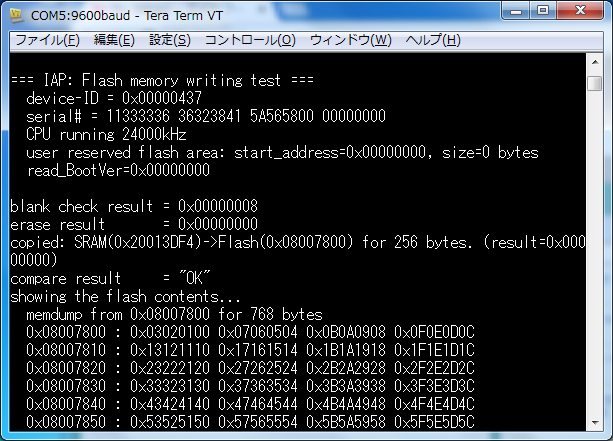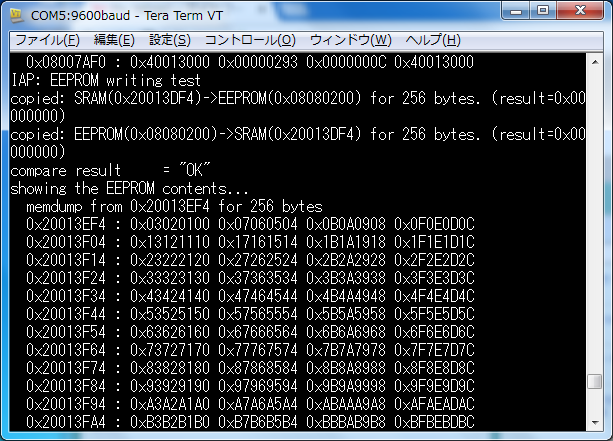STM32_IAP demo.
Fork of IAP_internal_flash_write by
main.cpp@0:b802bd2f4cc9, 2010-03-12 (annotated)
- Committer:
- okano
- Date:
- Fri Mar 12 10:24:57 2010 +0000
- Revision:
- 0:b802bd2f4cc9
- Child:
- 1:a85b51eeb446
Who changed what in which revision?
| User | Revision | Line number | New contents of line |
|---|---|---|---|
| okano | 0:b802bd2f4cc9 | 1 | /** IAP demo : demo code for internal Flash memory access library |
| okano | 0:b802bd2f4cc9 | 2 | * |
| okano | 0:b802bd2f4cc9 | 3 | * The internal Flash memory access is described in the LPC1768 usermanual. |
| okano | 0:b802bd2f4cc9 | 4 | * http://www.nxp.com/documents/user_manual/UM10360.pdf |
| okano | 0:b802bd2f4cc9 | 5 | * |
| okano | 0:b802bd2f4cc9 | 6 | * Chapter 2: "LPC17xx Memory map" |
| okano | 0:b802bd2f4cc9 | 7 | * Chapter 32: "LPC17xx Flash memory interface and programming" |
| okano | 0:b802bd2f4cc9 | 8 | * refering Rev. 01 - 4 January 2010 |
| okano | 0:b802bd2f4cc9 | 9 | * |
| okano | 0:b802bd2f4cc9 | 10 | * This main.cpp demonstrates how the flash can be erased and wrote. |
| okano | 0:b802bd2f4cc9 | 11 | * |
| okano | 0:b802bd2f4cc9 | 12 | * This program tries to... |
| okano | 0:b802bd2f4cc9 | 13 | * 0. read device ID and serial# |
| okano | 0:b802bd2f4cc9 | 14 | * 1. check if the targat sector blank |
| okano | 0:b802bd2f4cc9 | 15 | * 2. erase the sector if it was not blank |
| okano | 0:b802bd2f4cc9 | 16 | * 3. write into the flash (prepare before write) |
| okano | 0:b802bd2f4cc9 | 17 | * 4. verify the data by IAP command |
| okano | 0:b802bd2f4cc9 | 18 | * 5. show the content of the flash |
| okano | 0:b802bd2f4cc9 | 19 | * |
| okano | 0:b802bd2f4cc9 | 20 | * The Flash must be erased as sectors. No overwrite can be done like SRAM. |
| okano | 0:b802bd2f4cc9 | 21 | * So erase should be done in size of 4K or 32K. |
| okano | 0:b802bd2f4cc9 | 22 | * |
| okano | 0:b802bd2f4cc9 | 23 | * Writing sector can be done with size of 256, 512, 1024 or 4096. |
| okano | 0:b802bd2f4cc9 | 24 | * If other size is used, the IAP returns an error. |
| okano | 0:b802bd2f4cc9 | 25 | * The SRAM memory should be allocated in |
| okano | 0:b802bd2f4cc9 | 26 | * |
| okano | 0:b802bd2f4cc9 | 27 | * |
| okano | 0:b802bd2f4cc9 | 28 | * Released under the MIT License: http://mbed.org/license/mit |
| okano | 0:b802bd2f4cc9 | 29 | * |
| okano | 0:b802bd2f4cc9 | 30 | * revision 1.0 09-Mar-2010 1st release |
| okano | 0:b802bd2f4cc9 | 31 | * revision 1.1 12-Mar-2010 chaged: to make possible to reserve flash area for user |
| okano | 0:b802bd2f4cc9 | 32 | * it can be set by USER_FLASH_AREA_START and USER_FLASH_AREA_SIZE in IAP.h |
| okano | 0:b802bd2f4cc9 | 33 | */ |
| okano | 0:b802bd2f4cc9 | 34 | |
| okano | 0:b802bd2f4cc9 | 35 | #include "mbed.h" |
| okano | 0:b802bd2f4cc9 | 36 | #include "IAP.h" |
| okano | 0:b802bd2f4cc9 | 37 | |
| okano | 0:b802bd2f4cc9 | 38 | #define MEM_SIZE 256 |
| okano | 0:b802bd2f4cc9 | 39 | #define TARGET_SECTOR 29 |
| okano | 0:b802bd2f4cc9 | 40 | |
| okano | 0:b802bd2f4cc9 | 41 | void memdump( char *p, int n ); |
| okano | 0:b802bd2f4cc9 | 42 | int isprint( int c ); |
| okano | 0:b802bd2f4cc9 | 43 | |
| okano | 0:b802bd2f4cc9 | 44 | IAP iap; |
| okano | 0:b802bd2f4cc9 | 45 | |
| okano | 0:b802bd2f4cc9 | 46 | |
| okano | 0:b802bd2f4cc9 | 47 | int main() { |
| okano | 0:b802bd2f4cc9 | 48 | char mem[ MEM_SIZE ]; // memory, it should be aligned to word boundary |
| okano | 0:b802bd2f4cc9 | 49 | int r; |
| okano | 0:b802bd2f4cc9 | 50 | |
| okano | 0:b802bd2f4cc9 | 51 | printf( "IAP: Flash memory writing test\n" ); |
| okano | 0:b802bd2f4cc9 | 52 | printf( " device-ID = 0x%08X, serial# = 0x%08X, CPU running %dkHz\n", iap.read_ID(), iap.read_serial(), SystemCoreClock / 1000 ); |
| okano | 0:b802bd2f4cc9 | 53 | printf( " user reserved flash area: start_address=0x%08X, size=%d bytes\n", iap.reserved_flash_area_start(), iap.reserved_flash_area_size() ); |
| okano | 0:b802bd2f4cc9 | 54 | |
| okano | 0:b802bd2f4cc9 | 55 | for ( int i = 0; i < MEM_SIZE; i++ ) |
| okano | 0:b802bd2f4cc9 | 56 | mem[ i ] = i & 0xFF; |
| okano | 0:b802bd2f4cc9 | 57 | |
| okano | 0:b802bd2f4cc9 | 58 | // blank check: The mbed will erase all flash contents after downloading new executable |
| okano | 0:b802bd2f4cc9 | 59 | |
| okano | 0:b802bd2f4cc9 | 60 | r = iap.blank_check( TARGET_SECTOR, TARGET_SECTOR ); |
| okano | 0:b802bd2f4cc9 | 61 | printf( "blank check result = 0x%08X\n", r ); |
| okano | 0:b802bd2f4cc9 | 62 | |
| okano | 0:b802bd2f4cc9 | 63 | // erase sector, if required |
| okano | 0:b802bd2f4cc9 | 64 | |
| okano | 0:b802bd2f4cc9 | 65 | if ( r == SECTOR_NOT_BLANK ) { |
| okano | 0:b802bd2f4cc9 | 66 | iap.prepare( TARGET_SECTOR, TARGET_SECTOR ); |
| okano | 0:b802bd2f4cc9 | 67 | r = iap.erase( TARGET_SECTOR, TARGET_SECTOR ); |
| okano | 0:b802bd2f4cc9 | 68 | printf( "erase result = 0x%08X\n", r ); |
| okano | 0:b802bd2f4cc9 | 69 | } |
| okano | 0:b802bd2f4cc9 | 70 | |
| okano | 0:b802bd2f4cc9 | 71 | // copy RAM to Flash |
| okano | 0:b802bd2f4cc9 | 72 | |
| okano | 0:b802bd2f4cc9 | 73 | iap.prepare( TARGET_SECTOR, TARGET_SECTOR ); |
| okano | 0:b802bd2f4cc9 | 74 | r = iap.write( mem, sector_start_adress[ TARGET_SECTOR ], MEM_SIZE ); |
| okano | 0:b802bd2f4cc9 | 75 | printf( "copied: SRAM(0x%08X)->Flash(0x%08X) for %d bytes. (result=0x%08X)\n", mem, sector_start_adress[ TARGET_SECTOR ], MEM_SIZE, r ); |
| okano | 0:b802bd2f4cc9 | 76 | |
| okano | 0:b802bd2f4cc9 | 77 | // compare |
| okano | 0:b802bd2f4cc9 | 78 | |
| okano | 0:b802bd2f4cc9 | 79 | r = iap.compare( mem, sector_start_adress[ TARGET_SECTOR ], MEM_SIZE ); |
| okano | 0:b802bd2f4cc9 | 80 | printf( "compare result = \"%s\"\n", r ? "FAILED" : "OK" ); |
| okano | 0:b802bd2f4cc9 | 81 | |
| okano | 0:b802bd2f4cc9 | 82 | //#define WRITE_NEXT_BLOCK |
| okano | 0:b802bd2f4cc9 | 83 | #ifdef WRITE_NEXT_BLOCK |
| okano | 0:b802bd2f4cc9 | 84 | |
| okano | 0:b802bd2f4cc9 | 85 | // copy RAM to Flash |
| okano | 0:b802bd2f4cc9 | 86 | |
| okano | 0:b802bd2f4cc9 | 87 | iap.prepare( TARGET_SECTOR, TARGET_SECTOR ); |
| okano | 0:b802bd2f4cc9 | 88 | r = iap.write( mem, sector_start_adress[ TARGET_SECTOR ] + 256, MEM_SIZE ); |
| okano | 0:b802bd2f4cc9 | 89 | printf( "copied: SRAM(0x%08X)->Flash(0x%08X) for %d bytes. (result=0x%08X)\n", mem, sector_start_adress[ TARGET_SECTOR ], MEM_SIZE, r ); |
| okano | 0:b802bd2f4cc9 | 90 | |
| okano | 0:b802bd2f4cc9 | 91 | // compare |
| okano | 0:b802bd2f4cc9 | 92 | |
| okano | 0:b802bd2f4cc9 | 93 | r = iap.compare( mem, sector_start_adress[ TARGET_SECTOR ] + 256, MEM_SIZE ); |
| okano | 0:b802bd2f4cc9 | 94 | printf( "compare result = \"%s\"\n", r ? "FAILED" : "OK" ); |
| okano | 0:b802bd2f4cc9 | 95 | |
| okano | 0:b802bd2f4cc9 | 96 | #endif |
| okano | 0:b802bd2f4cc9 | 97 | |
| okano | 0:b802bd2f4cc9 | 98 | printf( "showing the flash contents...\n" ); |
| okano | 0:b802bd2f4cc9 | 99 | memdump( sector_start_adress[ TARGET_SECTOR ], MEM_SIZE * 3 ); |
| okano | 0:b802bd2f4cc9 | 100 | } |
| okano | 0:b802bd2f4cc9 | 101 | |
| okano | 0:b802bd2f4cc9 | 102 | |
| okano | 0:b802bd2f4cc9 | 103 | void memdump( char *base, int n ) { |
| okano | 0:b802bd2f4cc9 | 104 | unsigned int *p; |
| okano | 0:b802bd2f4cc9 | 105 | |
| okano | 0:b802bd2f4cc9 | 106 | printf( " memdump from 0x%08X for %d bytes", (unsigned long)base, n ); |
| okano | 0:b802bd2f4cc9 | 107 | |
| okano | 0:b802bd2f4cc9 | 108 | p = (unsigned int *)((unsigned int)base & ~(unsigned int)0x3); |
| okano | 0:b802bd2f4cc9 | 109 | |
| okano | 0:b802bd2f4cc9 | 110 | for ( int i = 0; i < (n >> 2); i++, p++ ) { |
| okano | 0:b802bd2f4cc9 | 111 | if ( !(i % 4) ) |
| okano | 0:b802bd2f4cc9 | 112 | printf( "\n 0x%08X :", (unsigned int)p ); |
| okano | 0:b802bd2f4cc9 | 113 | |
| okano | 0:b802bd2f4cc9 | 114 | printf( " 0x%08X", *p ); |
| okano | 0:b802bd2f4cc9 | 115 | } |
| okano | 0:b802bd2f4cc9 | 116 | |
| okano | 0:b802bd2f4cc9 | 117 | printf( "\n" ); |
| okano | 0:b802bd2f4cc9 | 118 | } |


